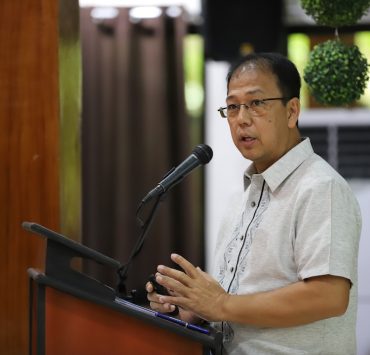As the 2019 novel coronavirus disease (COVID-19) continues to ravage the world and country, a picture is forming on how decisions made last year and stretching further back are affecting the present fight against the disease.
Hilda*, a domestic helper who grew up in a fifth-class municipality in Masbate, recalls how her grandmother passed away more than a decade ago. Suffering from a stroke, she was rushed to the sole hospital in their area. Because road infrastructure was poor, they had to take her by sea. Suffice to say, she did not make it.
Today, a strained healthcare system and shortage of professional health workers continues to plague the country. Even the capital, often accused as “imperial,” is not spared from this, as private hospitals in recent days have declared strained capacities.
In light of this, the private sector, from groups of individuals to companies, has mobilized to generate funds in order to secure medical supplies, personal protective equipment (PPE) and even food for frontline health workers amidst the outbreak.
[READ: Support frontliners and underserved communities from home through this website]Meanwhile, the Philippines’ Department of Health has called for volunteer health workers.
While private efforts remain laudable, the question now stands: Where is tax payer money going to especially in this time of crisis?
Pork, by any other name
What do pigs and honey bees have in common?
These critters are metaphors for government budgets, apparently.
Pork barrel, queen bee funds, priority assistance and development funds, disbursement acceleration, discretionary funds—these are old names for similar systems operating today.
Ateneo Human Rights Center attorney and executive director Ray Santiago clarifies that “the nature of such funds is precisely as the name provides—it is a discretionary fund. All that COA [the Commission on Audit] needs is documentation that such funds have actually been spent. Thus, what is a “priority” really depends on what the holder of the funds deems as such.”
Here, we take a close look at the systems currently directing the flow of public funds through the holders of the “power of the purse”—our lawmakers.
***
Annually, a General Appropriations Act (GAA) is passed outlining how funds will be spent in the coming fiscal year. The latest edition includes provisions for the funding of “aid and relief activities… and rehabilitation of [public] hospitals.”
Does the response to the spreading COVID-19 count as “aid and relief?”
Checks and balances, however, require an item-by-item listing of projects for funds to be disbursed. But given the nature of outbreak, the president recently requested emergency powers—eventually granted by the Congress and Senate—to speed up the appropriation of funds.
Essentially, the executive office aims to create an ad hoc GAA.
A number of us may have participated in the Million People’s March in late-2013 which called for the abolition of the “pork barrel” system where lawmakers were given “priority funds” to use for “pet projects.”
Since the system revamp in 2014, “discretionary funds” have since taken new iterations.
On paper, the annual national budget for “heads of offices” makes the following allotments per congressman: staff salaries, maintenance and operation funds and allowances for travel when they represent their constituents. There is, however, a fourth fund tier that requires more scrutiny.
In September 2019, P10 billion were slashed from the Department of Health’s 2020 budget. That same month, a P100 million budget was allegedly approved per congressman, drawn from the 2020 national budget of around P4 trillion, with P30 million apparently for healthcare with the remaining P70 million going to infrastructure.
Later in October 2019, lump-sum funds that were deemed illegal in 2014’s GAA were deemed constitutional by the Supreme Court. All this, as lawmakers who attempted to question these decisions as late as March 2020 were ostracized by peers.
P30 million “for medical assistance” per solon. That’s a total of P9.09 billion in Congress alone.
A source working with the Office of the Vice President shares that in securing supplies for medical frontliners, barring logistical costs, the price of PPE from medical supply manufacturers they’ve contacted fluctuates between P800 to P1,400.
Meanwhile, an organizer from a citizen movement raising funds for medical supplies gave a starting estimate of around P700 per PPE. Inflation amid PPE demand accounts for these fluctuating price ranges.
Locally-made COVID-19 test kits cost P1,320 versus the P8,500 cost of imported ones, barring shipment fees.
Each congressman can thus theoretically purchase around 21,400 up to 42,800 PPE, or around 22,720 local test kits or 3,500 imported test kits. Multiply those figures by 303 and a picture emerges of each district’s ability to mitigate the spread of COVID-19.
Meanwhile, Hilda shares that there is still a lack of doctors in their area, with most turning to local faith healers for medical assistance. Between the declaration of community quarantine in Metro Manila and its actual enforcement, a lot of relatives and neighbors from her hometown left the Metro when sea lines were still open to return to Masbate. They have chosen to quarantine themselves at home, in the province.
While call-outs are often criticized (lately by troll armies) as “armchair activism,” recent developments show that power still lies with the people.
Freedom of information
It remains to be seen where the lawmakers’ funds are.
The Freedom of Information Order, which requires government spending to be documented and made publicly available, was enacted in late 2016. Currently, as an Executive Order with the threat of being removed by a future administration, it’s weaker than a law.
Nonetheless, an online, government-run database of government records continues to operate. Aside from requesting for information and data, site visitors also have access to existing requests made by previous visitors.
As of press time, however, on-site request forms remain suspended “due to COVID-19.”
When official channels fail, citizens take to the court of the street—or social media—to voice misgivings, recently towards a perceived lack of response from the national government to the novel virus.
Filipinos have concocted many ways, many recipes, many names by which to cook pork, but Santiago points us to the latest jurisprudence targeting “disbursement acceleration” from the past administration (Araullo vs. Aquino, 2014), maintaining that any unlisted expenditures remain illegal, no matter the intention, no matter the seasoning.
Court action without citizen vigilance, however, is not enough.
The Mar. 24 nighttime presidential address from Malacañang shows that the collective citizenry’s voice has impact. While a controversial bill was passed granting the president emergency powers to respond to the COVID-19 crisis, these powers have been tempered by amendments from senators, all amid a sustained online uproar from average citizens.
While call-outs are often criticized (lately by troll armies) as “armchair activism,” recent developments show that power still lies with the people. Aside from informal methods such as social media, if enough citizens request for an itemization of all government COVID-19 “emergency expenses” via the FOI website, more dents may be made towards more transparent and open governance.
As the national response to COVID-19 unfolds, private efforts continue to funnel aid to the frontlines. While we’re at it, let’s also keep the ball rolling towards our elected officials’ court, keeping the pressure on their privilege.
*Name changed to protect privacy. Keep tabs on the freedom of information site. View a complete database of hospitals requesting aid here and a list of accredited citizen “help-from-home” initiatives here. Additional reporting by Malaika E. Paculan
Get more stories like this by subscribing to our weekly newsletter here.
Read more:
Residents of subdivisions are in no need of government help, says DILG
Support frontliners and underserved communities from home through this website
Donation drives you can pitch in to help underserved communities right now
Writer: PAOLO VERGARA
ART JOEY SIMBULAN




